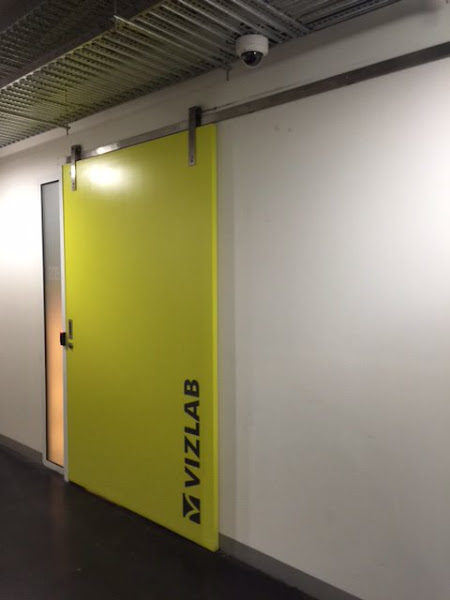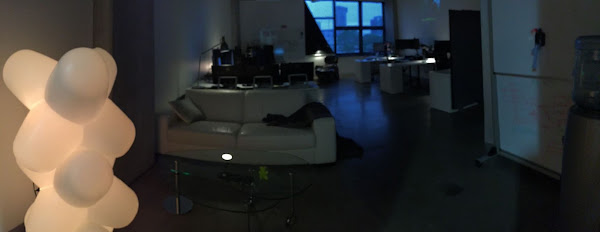VizDynamics has halted trading, and VizLab 2.0 is now closed. The lack of attention to 'cybersecurity' [sic] by state actors, big tech and cloud operators globally made it impossibly difficult to continue operating an advanced computer science lab with a rotating schedule of 6-12 of Melbourne's best computer scientists supporting corporate Australia. We could have continued, but we saw this perfect storm of cyber security coming and decided to dial down VizLab starting in 2017. Given recent cyber disasters, it is clear we made the right decision.
State actors, cloud operators and big tech need to be careful with “vendor backdoor” legislation such as key escrow of encryption, because this form of 'friendly fire' hides the initial attack vector and the intial point of network contact when trying to forensically analyse and close down real attacks. Whilst that sort of legislation is in place without apporpriate access controls, audit controls, detective controls, cross-border controls, kill switches and transparency reporting, it is not commercially viable for us to operate a high powered CS lab, because all the use cases corporate Australia want us to solve involve cloud-based PII, for example, ‘Prediction Lakes’.
A CS Lab designed for paired programming
Part MIT Media lab, part CMU Autonlab, part vizualistion lab, part paired-programming heaven: this was VizLab 2.0.
A secure site in a secure site.
Note the 3-screen 4k workstation in the foreground designed
for paired local + remote programming.
Note the Eames at the end of the centre aisle and the Tom Dixon in the foreground.
Each workstation was setup for paired programming but with a vibe like it's an ad agency studio. 6 workstations w/ 6-9 fully traffic managed engineers in rotation, where you could plug in 2 keyboards, 2 mice, 2 chairs side-by-side and enough room so that you weren't breathing on eachother with returns either side big enough for a plethora of academic texts, client specs and all the notes you could want. With 2 HDMI cables hung from the roof linking to projectors on opposing walls that could reach any workstation at any moment, this was an environment for working on hard things; collaboratively, together.
Note the lack of client seating. They would have to perch on the edge of a desk and see everything, or an Eames lounge at the end of the room and try to see everything, or a White real leather Space Furniture couch next to a Tom Dixon and see nothing - we took host to management teams from a plurality of ASX200s, and the first thing that struck them — we didn't have seating for them, because the next few hours they were going to be moving around and staring at walls, computers, the ceiling — there simply was nowhere to sit, when a team of computer scientists, trained in computer graphics and very deft with data science were taking them on a journey into Data.
The now: VizLab 3.0 – The future: VizLab 4.0
AP is still around and is spending the most part of 2023 writing a textbook on secure software engineering, and we've setup a smaller two-man VizLab 3.0 for cyber defence research mainly around GRC assessment and computer science education both at a secondary and a tertiary level. AP is currently doing research in that field so we can hopefully reduce cyber-risk down to a level that is acceptable to coprorate Australia by increasing the mathematical and cyber-security awareness and literacy of computer science students as they enter into university and then industry.
If we can help to create that environment, then VizLab 4.0 may materialise and will be bigger and better, but because we dialed back our insurances (it's not practical to be paying $25K pa while we're doing research), we aren't in a position to provide direct consultation services at the moment. VizDynamics is still a trading entity, and a new visualisation based Information Security brand might be launched somewhere in 2024 based on the “Humanizing Data” vizualisation thesis (perhaps through academia or government – we’re not sure yet). Fixes are happening to WebGL rendering engines, and slowly cyber security awareness is rising to the top of the agenda, so our work is slowly shifting the needle and we’re moving in the right direction.
If you want to keep track of what AP's up to, vizit blog.andrewprendergast.com.
2025 Edit - Updates re Vendor Backdoors & UN No-Touch Cyber Torture of Computer Scientists in Australia
Update April 2024: I have revealed on 𝕏 some concrete evidence of vendor backdoors Microsoft E365 being misused by state police. These backdoors have to go - computers are deterministic in nature, and we can't have them doing things for no reason. It is not possible to run a heavy duty computer science lab whilst this is a problem.
𝗢𝗡 𝗩𝗘𝗡𝗗𝗢𝗥 𝗕𝗔𝗖𝗞𝗗𝗢𝗢𝗥𝗦
— Ä̷̬͖̽͗P̷̭̳͔͇̊ on CompSciFutures (∀/∃/acc) (@CompSciFutures) March 28, 2025
Given what I revealed re: #VendorBackdoor in @SharePoint E365, this shenanigans by @elonmusk is now the biggest contribution made to "cybersecurity" [sic] in the past decade. The defn. of computer has now changed.#WikiNoyingLeaks #clowd
.\𝒫 https://t.co/VgdiF8a7nT pic.twitter.com/GaffuHE9mm
Update November 2025: I have written a long thread on 𝕏 about engineers being soft targets for police/intelligence state actors with special powers. The UN OHCHR now has a well defined thesis called 'No-Touch Cyber Torture'. Every CS/EE/SWE/Network engineer needs to be hyper aware of it. More details in this 𝕏 post:
This is the official UN definition of No-Touch Cyber Torture from the @OHCHR @UNrefugees @Refugees Cyber Torture Forum RFP (see https://t.co/wskpkvTab4).
— Ä̷̬͖̽͗P̷̭̳͔͇̊ on CompSciFutures (∀/∃/acc) (@CompSciFutures) November 4, 2025
List of techniques deployed are:
1. Surveillance
2. Profiling
3. Conditioning
4. Anchoring
5. Mobbing/Gangstalking (using an… pic.twitter.com/2ffSt1xpqF
I'm not currently able to work on anything much as Victoria Police have found some success in a mass-surveillance startup (which I'm vehemently opposed to) using their special powers to steal Intellectual Property from VIZLAB and have now stepped up their UN No-Touch Cyber Torture campaign against me.
Two of the ring-leaders are B. Ellison and Mooney at Prahran & Malvern Police stations -- please do let me know if you get a call from them.
If you feel like you could possibly be a persecuted computer scientist, please get in touch with me by email then we can talk on Signal Messenger about how to properly document the events as a legal brief in a way that makes sense and doesn't come across the wrong way. It's a bit of work, but one can do alot with PowerPoint and UML :)
On Signal Messenger & No Riff-Raff Secure Communications
P.S. This 𝕏 thread explains why you should use Signal to talk to Computer Science. That is the one that Computer Science, Electrical Engineering, Software Engineering and even the US Department of Defence uses, and is the one that has unlimited funding forever from Silicon Valley. That is the one you want too!
WhatsApp and Telegram are kind of okay, but Signal Messenger is the no riff-raff encrypted messaging & secure communications app with no advertising hooks, good provenance and good governance.
𝗪.𝗥.𝗧. 𝗦𝗜𝗚𝗡𝗔𝗟 𝗠𝗘𝗦𝗦𝗘𝗡𝗚𝗘𝗥 & 𝗦𝗘𝗖𝗨𝗥𝗘 𝗖𝗢𝗠𝗠𝗦.
— Ä̷̬͖̽͗P̷̭̳͔͇̊ on CompSciFutures (∀/∃/acc) (@CompSciFutures) November 14, 2025
"It is not safe to talk to computer scientists on insecure channels" -- AP from #SiliconValley & #SignalsDirectorateKids. Ex-Xerox #PARC, ex-#Omnicom Chief Scientist, ex-#Intel Semiconductor, ex #Xoogler. pic.twitter.com/PaC1XTGTHh
Many of the problems we've had at VIZLAB wouldn't have happened or at least would have been significantly reduced if we all used properly encrypted communications for everything we do, not just for secure client data storage & transport. We do now know that phone calls to and from a CS lab need to be kept secure as well.
By way of illustration: The USA has now released a joint statement with CISA, FBI, and the ACSC in Australia, Canada and NZ admitting our SS7 telecommunications networks are stuffed and urgently recommends the use of Signal Messenger or other end-to-end encryption ASAP. I expect in time the AFP will make a similar announcement to all Australians. In the meantime, this is the US announcement:
Here is an example of why we need to use Signal
Being a computer scientist trained in Number Theory (#NumThe), This is a standard computer science conversation that I have with people all the time – this is a prototypical exemplar of why all our convsations are monitored and why you do need to talk to us with Signal. This is a normal conversation in my world:
but does attract attention when said in cleartext.
If you interact with us, please understand - we (#compSci, #SWE and #EE) aren't part of intelligence, but now that computers control everything, we are required to interact with the like of NSA, so compulsory secure communiations with everyone is now a part of our world.
"It is not safe to talk to computer scientists on insecure channels" -- AP from #SiliconValley & #SignalsDirectorateKids. Ex-Xerox #PARC, ex-#Omnicom Chief Scientist, ex-#Intel Semiconductor, ex #Xoogler.
Please use Signal when talking to us - for your safety, and ours.It's the no-riff-raff option.
.\𝒫
␄






1 comment:
Nice shhare
Post a Comment